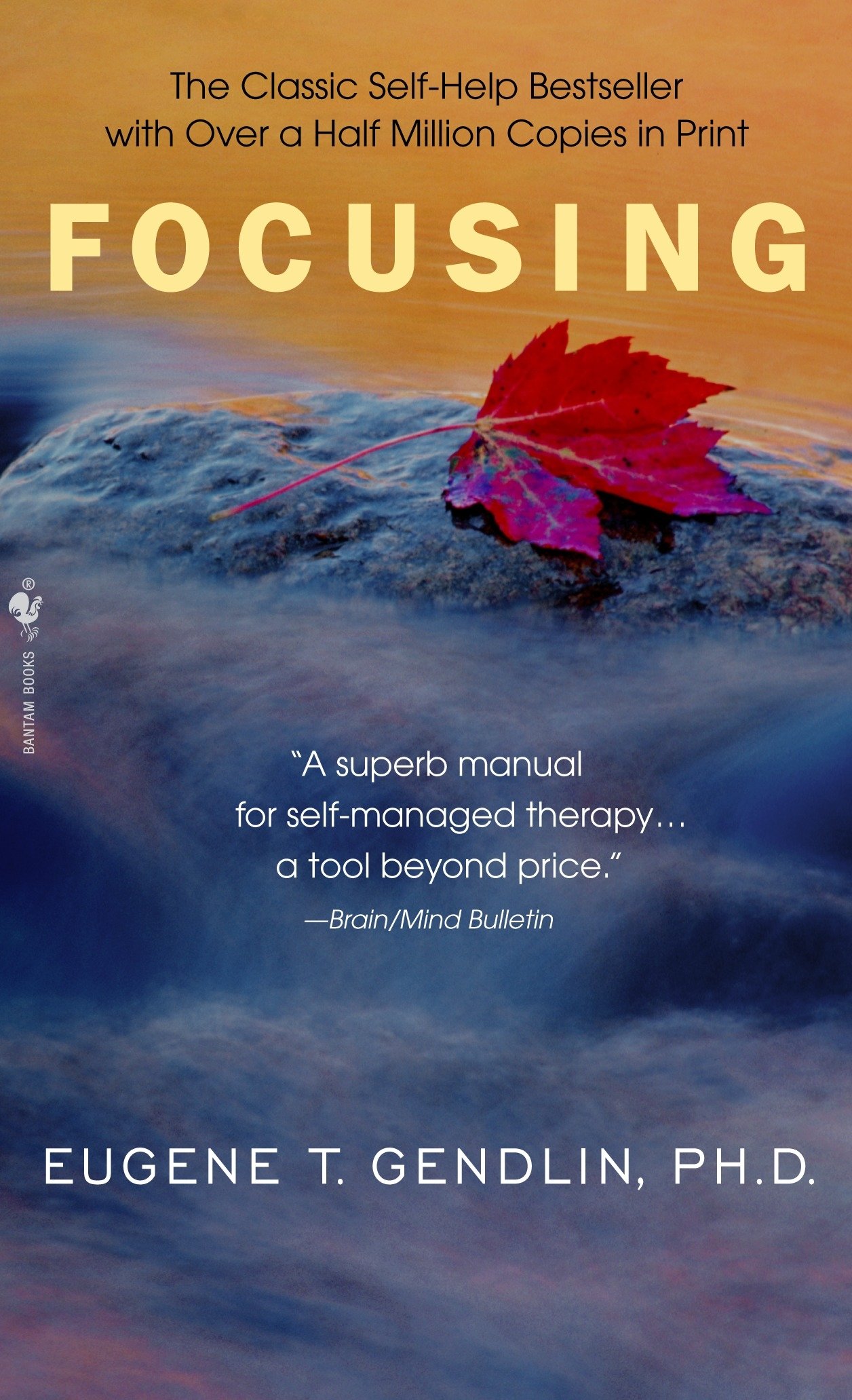Focusing is a practice developed from the Philosophy of the Implicit. The International Focusing Institute – Building on the work of Eugene T. Gendlin since . Focusing has ratings and 72 reviews. Steve said: For those of us who have to tend to the effects of complex ptsd the most difficult challenge is to c. Focusing may refer to: Adjusting an optical system to minimize defocus aberration · Focusing (psychotherapy), a psychotherapeutic technique.
| Author: | Tygolrajas Maubar |
| Country: | Turkey |
| Language: | English (Spanish) |
| Genre: | Marketing |
| Published (Last): | 17 February 2015 |
| Pages: | 208 |
| PDF File Size: | 15.12 Mb |
| ePub File Size: | 8.1 Mb |
| ISBN: | 146-1-27882-944-1 |
| Downloads: | 18335 |
| Price: | Free* [*Free Regsitration Required] |
| Uploader: | Tezshura |
Six steps to just take a moment and focus on your current feelings – with plenty of examples to back it up, which I appreciated.
Nor does the difference lie in what the patients talk about. Yes, gocusing resembles that, but it really isn’t. Belonging and Crossing in Community: However, I feel that there is still relevance in the primary content of the book even if parts of it could be modernized. Gendlij what is next for the body is not what would logically come next.
Read PDF Focusing Eugene T Gendlin FOCUSING with Eugene T. Focusing Eugene T. They include Experiencing and the Creation of Meaning, (in paperback) and Language Beyond Post-Modernism: Saying and Thinking In Gendlin's Philosophy (edited by David Levin), both from Northwestern University Press, l997 and A Process Model. Focusing - Eugene Gendlin. Focussing is a way of listenning to your body and bringing awareness to this. Eugene Gendin dedicated his career to it. Biographic Note: Eugene T. Gendlin is a seminal American philosopher and psychologist. He received his Ph.D. In philosophy from the University of Chicago and taught there from 1963 to 1995. He received his Ph.D. In philosophy from the University of Chicago and taught there from 1963 to 1995.
- Major Articles by Eugene Gendlin. Focusing-Oriented Psychotherapy: A Manual of the Experiential Method, by Eugene T. Gendlin, Chapters 2 & 3 from Focusing-Oriented Psychotherapy: A Manual of the Experiential Method, The Guilford Press. 1996 The Experiential Response, Eugene T. Gendlin, Book chapter 26 in Use of Interpretation in Treatment, Grune and Stratton, Inc.
- Focusing is an innovative technique developed by Eugene Gendlin in the 1960’s. The earliest origins of Focusing are found in Gendlin’s collaborative relationship in the 1950’s with Carl Rogers, the Founder of Client-Centered Psychotherapy. By 1970 Gendlin was recognized by the American Psychological Association as the.
Useful concepts derive from and are relative to this sense more than logical, intricate order, not the other way round.
Eugene Gendlin – Wikipedia
Focusing grew out of the observation by Gendlin and his co-workers that many people were not being helped by traditional therapy. ContentMain NavigationSearchLogin.
Once you have the fuller felt-sense understanding, if you accept that felt-sense than it will change. We have deeper wells of knowledge within us than we consciously know.
This training is called ‘Focusing’. Therefore this knowledge, here, must arrange for itself to be superseded by you, as you sense for what feels sound, gendlon you. Most people find it easier to learn focusing through individual instruction than through simply reading about it.
It moves us into unfamiliar territory, the realm of creative potential that we have usually considered the province of artists and inventors. They lose authority I suppose. It consists of six focsuing steps that identify and change the way thoughts and emotions are held within the body.
Bulletin Board Worldwide Focusing Events. But, human processes do give rise to more different specifics than can be logically consistent.
But you can feel all of these things together. Gendlin developed a way of measuring the extent to which an individual refers to a felt sense; and he found in a series of studies that euvene clients who have positive outcomes do much more of this.
Not for me; maybe for you. ContentMain NavigationSearchLogin. Yes, the introduction may sound exaggerated with its claims, but that was the cultural manner of those times. Wat mij stoorde was de taal, de vertaling en focusijg lay-out. May 06, Carlos Xavier rated it really liked it.
Focusing by Eugene T. Gendlin
ggendlin Gendlin is best known for Focusing and for Thinking at the Edgetwo procedures for thinking with more than patterns and concepts. We offer one approach here: It did take place, we are they; it didn’t change much, because most of it is nonsense. I have been able to do this f There are two skills that every self help book assumes you already have to some degree.

Please notice, we don’t say that this method is all you need or might find valuable. We are trying to keep apace of rapidly changing technology, foocusing to understand ourselves and our relationships, seeking new ways to be well, looking for meaning in our work and a new center of gravity within ourselves.
Human nature is not fixed and not knowable in some single system. It’s about getting in touch with your body for therapy reasons, to identify how you are feeling eugenne hiding behind language.
Eugene T. Gendlin
Clinical formulation Clinical pluralism Common factors theory Discontinuation History Practitioner—scholar model. Jul 28, Christina rated it liked it Shelves: Anything human involves more grndlin one method.
Focusing by Eugene Gendlin, Ph.
TOP Related
 Publisher: Guilford Press
Publisher: Guilford PressISBN: 1462505627
Size: 15.25 MB
Format: PDF, ePub, Mobi
Gene Gendlin
View:

Focusing Eugene Gendlin Free Pdf
122Focusing Eugene Gendlin Techniques
Get Books
Focusing Oriented Psychotherapy
eBook File: Focusing.PDF Book by Eugene T. Gendlin, Focusing Oriented Psychotherapy Books available in PDF, EPUB, Mobi Format. Download Focusing Oriented Psychotherapy books , Examining the actual moment-to-moment process of therapy, this volume provides specific ways for therapists to engender effective movement, particularly in those difficult times when nothing seems to be happening. The book concentrates on the ongoing client therapist relationship and ways in which the therapist's responses can stimulate and enable a client's capacity for direct experiencing and 'focusing.' Throughout, the client therapist relationship is emphasized, both as a constant factor and in terms of how the quality of the relationship is manifested at specific times. The author also shows how certain relational responses can turn some difficulties into moments of relational therapy.
, Examining the actual moment-to-moment process of therapy, this volume provides specific ways for therapists to engender effective movement, particularly in those difficult times when nothing seems to be happening. The book concentrates on the ongoing client therapist relationship and ways in which the therapist's responses can stimulate and enable a client's capacity for direct experiencing and 'focusing.' Throughout, the client therapist relationship is emphasized, both as a constant factor and in terms of how the quality of the relationship is manifested at specific times. The author also shows how certain relational responses can turn some difficulties into moments of relational therapy.